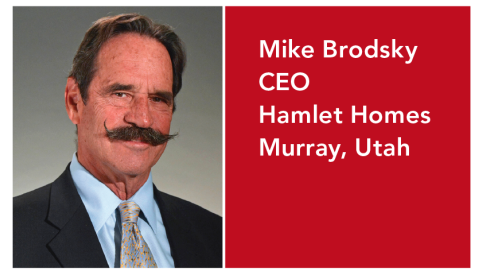During the housing downturn, Tim Kane, longtime president of MBK Homes, scaled back his operations to match demand and searched out new opportunities for his company. Where once MBK was purely a single-family detached builder, Kane has broadened the firm’s offering to everything from live/work units to rehabbing distressed REO properties. Our discussion with Kane also touches upon the importance of differentiating product offerings versus the market and the advantages of being owned by Mitsui, a large Japanese multinational.
Professional Builder: We first interviewed you at MBK six years ago, when housing was so much stronger. How have you managed through this downturn?
Tim Kane: Our concern during the downturn with a company like Mitsui, which is in 68 different countries around the world and has investments in all kinds of businesses, was whether they would continue to support home building. And the answer was yes. They did so because the United States is one of the few developed countries in the world with a growing population. So they see the U.S. as a long-term opportunity for housing. They have also shown us a tremendous amount of support. We are no longer using our long-established lines of credit with U.S. banks because our parent company is financing our business. That occurred when one of our banks in Texas was suddenly taken over by the FDIC. We had five projects with construction loans all funded by that bank, and then there was no more bank. We called our parent company, they responded immediately, and we never delayed any house by a single day.
PB: You have broadened your company’s offering. Why have you diversified?
TK: We took a look and decided that we had been defining ourselves too narrowly as home builders and that we actually have a much broader mission, which is to provide shelter. That mission includes rental housing, for-sale attached, for-sale detached, and even REO business. So we are currently examining and re-examining all of those businesses.
PB: What sort of thought process went into your decision to enter the REO market?
TK: New homes, in their heyday, used to represent almost 20 percent of houses that were being sold. New homes now represent less than 3 percent of the market. The rest of that market has been taken up by distressed property. We do not think that distressed property is a long-term opportunity. But it is an opportunity that is available right now.
PB: If we go back to some of those other segments, rental and condos for sale, can you talk about them?
TK: We just opened a new condo project in the city of Gardena, Calif. We are currently building the first phase and are pre-selling now. Models will be open the second week of January. We released 16 units for sale recently and have sold nine of them so far. About a third of the product is live/work. We are selling those at a premium and have seen a lot of interest in them. The rest of the project is composed of townhomes, which are being purchased largely by Asian buyers.
We purchased the property four and a half years ago and delayed building for a time. But the decision was made recently: let’s start building the community. So we kind of crossed our fingers, took a deep gulp, and started selling them, and it has proven to be quite successful. We have a number of other properties that we have purchased but are holding on to for the time being. As far as buying land, we are cautious. We have gone back and looked at land that we considered buying two years ago and we are breathing a sigh of relief that we did not buy it, because the market has declined since then. And the margins on buying land are still very skinny. That being said, we are still looking for well-located coastal infill properties.
PB: What is the key to selling houses right now?
TK: One of the reasons the Gardena condo project is selling so well is that we made a very concerted effort to make these houses different than the distressed houses that people could buy. First, the project is USGBC LEED Silver. It has solar on top of that. It is a unique product in the area and very contemporary-looking, with features not found in the older homes within the surrounding community. So if buyers want a quality product and want to buy new, they cannot go down the road and find even close to an equally desirable foreclosed property, because there is nothing else like it.
Advertisement
Related Stories
Hamlet Homes' Mike Brodsky on Finding Successors and Letting Go
A transition that involved a national executive search, an employee buyout, and Builder 20 group mentorship to save the deal
Time-Machine Lessons
We ask custom builders: If you could redo your first house or revisit the first years of running your business, what would you do differently?
Back Story: Green Gables Opens Up Every Aspect of its Design/Build Process to Clients
"You never want to get to the next phase and realize somebody's not happy."







